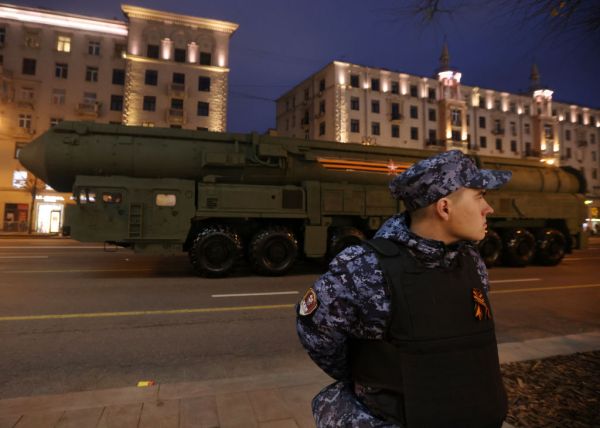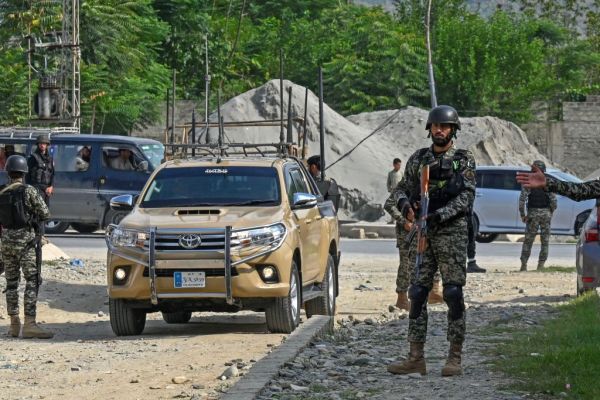Happy Thursday! The New Yorker profiled our own Advisory Opinions podcast, concluding that, “in an era of aggrieved political discourse, [Sarah] Isgur is something unusual: a commentator who truly seems to love the government institution she covers.”
Jonah and Steve spent much of their time yesterday working the phones, desperately trying to get similar writeups of their own “flagship” podcasts. Maybe Egghead Monthly will bite.
Quick Hits: Today’s Top Stories
- Israeli Prime Minister Benjamin Netanyahu on Wednesday rejected Hamas’ proposed ceasefire agreement and hostage-release proposal—drawn up at the request of Qatari and Egyptian mediators—dismissing the plan as “delusional.” Under the Hamas proposal presented to Israel on Tuesday, the terrorist organization would return all of the estimated 136 hostages held in Gaza—a fifth of whom are believed by Israeli officials to be dead—in a phased release. In exchange, Hamas demanded the freeing of hundreds of Palestinian prisoners, including senior members of the terrorist organization, and a permanent ceasefire to end the war—a provision which would have functionally allowed Hamas to remain in power in Gaza following an Israeli withdrawal from the enclave. Netanyahu promised Israel was on its way to “absolute victory” in its war against Hamas, but did not close the door on continued negotiations.
- U.S. Central Command (CENTCOM) announced on Wednesday that the U.S. military had launched a unilateral drone strike on a vehicle in eastern Baghdad, Iraq, which killed a commander of Kata’ib Hezbollah, the Iranian-backed militia the U.S. intelligence community has said is responsible for the attack on Tower 22 in Jordan late last month that killed three U.S. service members and injured dozens of others. The commander, CENTCOM said, was “responsible for directly planning and participating in attacks on U.S. forces in the region,” adding that “there are no indications of collateral damage or civilian casualties at this time.” Kata’ib Hezbollah later reported that the blast had killed Abu Baqir Al-Saadi, the commander in charge of its Syria operations.
- More than 150 people have been arrested in Senegal since Monday as part of ongoing protests over President Macky Sall’s move to delay presidential elections originally set for later this month, with demonstrators raising concerns over alleged corruption in the candidate selection process. On Monday, the Senegalese parliament voted to postpone the election until December, functionally extending Sall’s second term as leader of the West African country generally considered a stable democracy in a turbulent region. Sall has said he will not seek a third term—from which he is constitutionally barred—but opponents have called the election maneuver a “constitutional coup.”
- U.S. and allied intelligence agencies released a statement on Wednesday warning of a Chinese hacking campaign against U.S. critical infrastructure and encouraging managers of those IT systems to attempt to mitigate the risk of an attack. Chinese state-sponsored hackers have had access to some U.S. infrastructure systems for as long as five years, the report said, in order “to pre-position themselves on IT networks for disruptive or destructive cyberattacks against U.S. critical infrastructure in the event of a major crisis or conflict with the United States.”
- The U.S. military’s North American Aerospace Defense Command (NORAD) said Tuesday that it had “detected and tracked four Russian military aircraft operating in the Alaska Air Defense Identification Zone (ADIZ),” which stretches 150 miles off the Alaskan coastline. The Russian planes never entered U.S. or Canadian airspace, NORAD said, adding that there is often Russian activity in the region that is not considered threatening.
- Five U.S. Marines are missing after the helicopter they were flying was found 35 miles east of San Diego, California, on Wednesday morning. The CH-53E Super Stallion helicopter the marines were in took off from Creech Air Force Base Tuesday night for a routine training flight but was reported “overdue” Tuesday night for its arrival at Marine Corps Air Station Miramar in California. Local authorities found the aircraft in rough terrain on Wednesday morning, though it’s not yet clear why the helicopter went down. Rescue teams are fighting rain and snow in the area, part of the storms generated by the atmospheric river pummeling southern California.
- The Congressional Budget Office released projections on Wednesday that show the U.S. deficit will likely hit $1.6 trillion by the end of this year and grow to $2.6 trillion in 2034, largely due to interest payments on the national debt and the costs of Social Security for an aging population. Despite ultimately growing, the projection is lower than last year’s thanks in part to budget caps negotiated by former House Speaker Kevin McCarthy and President Joe Biden as part of the Fiscal Responsibility Act.
- The Senate failed to advance its bipartisan immigration and foreign aid package on Wednesday with a vote of 49-50. Only three Republicans—Sen. James Lankford of Oklahoma, one of the bill’s authors, Sen. Mitt Romney of Utah, and Sen. Lisa Murkowski of Alaska—voted in favor of closing debate on the package in advance of a vote. The procedural measure, called cloture, needed 60 votes to pass. It’s unclear whether a push to pass aid to Ukraine and Israel without border provisions attached will meet a similar fate.
A MESSAGE FROM THE FLIP SIDE
See both sides of important issues—in 5 minutes a day

Don’t have time to supplement your Dispatch reading with the New York Times, Washington Post, and the Wall Street Journal? We got you. We’re a one-stop shop for political analysis from both liberal and conservative media. Here’s one of our quarter million readers in their own words:
“It’s fantastic, balanced, just the right length. I’m finding it extremely helpful.”
Pakistan’s Election: No Ifs, Ands, or Bats

Two bomb explosions killed at least 28 people in the Balochistan province of Pakistan yesterday, just one day before citizens were set to head to the polls. The terrorist attack, claimed by the Islamic State, has become a familiar occurrence in the country. “In the lead-up to the vote, there have been no less than 24 reported instances in which armed groups have staged attacks against members of political parties,” said Elizabeth Throssell, a spokesperson for the U.N. High Commissioner for Human Rights.
Terror attacks are just one of the myriad problems that have impacted Pakistan’s fraught election—one that many Pakistanis believe is already decided. Former Prime Minister Imran Khan is currently in jail and is prevented, along with his Pakistan Tehreek-e-Insaf (PTI) party, from running in the election. His closest competitor, Nawaz Sharif of the Pakistan Muslim League (PMLN), is also a former prime minister who was thrown out of office and exiled. Increasing internal violence, political instability, and a stagnating economy plague the struggling democracy, and the military appears to hold more sway over the outcome of today’s vote than the Pakistani people. Democracies across the globe are anxiously watching not just who wins the election, but how it is carried out.
Pakistan, the fifth-most populated nation on earth and a nuclear power, remains a …
As a non-paying reader, you are receiving a truncated version of The Morning Dispatch. Our full 1,429-word story previewing Pakistan’s election is available in the members-only version of TMD.
Worth Your Time
- Earlier this week, Rep. Mike Gallagher of Wisconsin was one of three GOP representatives to break with his party and vote against impeaching Homeland Security Secretary Alejandro Mayorkas. On Wednesday, Gallagher took to the pages of the Wall Street Journal to explain why. “Impeachment not only would fail to resolve Mr. Biden’s border crisis but would also set a dangerous new precedent that would be used against future Republican administrations,” he wrote. “If we are to make underenforcement of the law, even egregious underenforcement, impeachable, almost every cabinet secretary would be subject to impeachment. The Treasury and State departments’ nonenforcement of sanctions against Iran has emboldened a regime that is killing Americans in the Middle East. The defense secretary is clearly violating the Hyde Amendment by allowing defense travel funds to be used to facilitate abortions. These decisions—however reprehensible—aren’t high crimes or misdemeanors but would be impeachable under the new standard. Perhaps this is why we have never impeached a cabinet secretary except for criminal behavior. The person chiefly responsible for the chaos and devastation that has unfolded at the border is Mr. Biden, not Mr. Mayorkas. If Mr. Mayorkas were removed, his replacement would also implement Mr. Biden’s disastrous border policies. If anything, impeaching Mr. Mayorkas would absolve Mr. Biden of blame for his own policies. Creating a new, lower standard for impeachment, one without any clear limiting principle, wouldn’t secure the border or hold Mr. Biden accountable. It would only pry open the Pandora’s box of perpetual impeachment.”
Presented Without Comment
The Hill: Speaker [Mike] Johnson Amid Criticism: ‘Mess’ in House Not ‘A Reflection on the Leader’
Also Presented Without Comment
Reuters: Kremlin Confirms [Vladimir] Putin Gave Interview to Ex-Fox News Host Tucker Carlson
Kremlin spokesman Dmitry Peskov said Putin had agreed to the Carlson interview because the approach of the former Fox News host differed from the “one-sided” reporting of the Ukraine conflict by many Western news outlets.
“When it comes to the countries of the collective West, the large network media, TV channels, (and) large newspapers can in no way boast of even trying to at least look impartial in terms of coverage,” Peskov told a regular news briefing on Wednesday.
“These are all media outlets that take an exceptionally one-sided position. Of course, there is no desire to communicate with such media, and it hardly makes sense, and it is unlikely that it will be useful.”
Also Also Presented Without Comment
NBC News: In His Second Mix-Up This Week, Biden Talks About Meeting With Dead European Leaders
Toeing the Company Line
- In the newsletters: Scott broke down (🔒) the shortcomings of the Biden administration’s new rule on “gig work,” the Dispatch Politics crew covered the immigration bill’s demise and checked in on Nikki Haley’s campaign ahead of Super Tuesday, and Nick lamented (🔒) the crisis of leadership plaguing the GOP.
- On the podcasts: On an emergency episode of Advisory Opinions, Sarah and David responded to the D.C. Circuit Court’s ruling that Trump does not have immunity from prosecution. On The Remnant, Jonah talks to his AEI colleague Kevin Kosar about 20th-century political scientist Edward Banfield and the limits of government central planning.
- On the site today: William Hodes sorts out the latest E. Jean Carroll verdict, and Mark Caleb Smith explains sore loser laws.











Please note that we at The Dispatch hold ourselves, our work, and our commenters to a higher standard than other places on the internet. We welcome comments that foster genuine debate or discussion—including comments critical of us or our work—but responses that include ad hominem attacks on fellow Dispatch members or are intended to stoke fear and anger may be moderated.